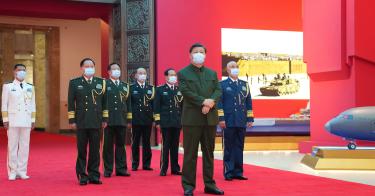The annual meeting of top Chinese Communist Party figures at the Beidaihe resort east of Beijing has ended. Xi Jinping and other senior Chinese leaders emerged Tuesday after a two-week absence from the public eye. The next big meeting will be the 20th Party Congress, set for sometime this fall, where Xi is expected to win big and consolidate power.
The Beidaihe retreat is probably the most important informal event on China's political calendar. It's where the party's most senior leaders and retired elders make some of their most consequential decisions. This includes many of the personnel appointments that will be unveiled at the Party Congress.
Everything about the gathering is kept secret. The dates it occurs—and even its very existence—are never confirmed by state-run media. Leaders simply disappear for two weeks, as security tightens around Qinhuangdao, where Beidaihe is located.
This secrecy only fuels the rumors circulating among China watchers. In the coming weeks, pundits will cite "insiders" with purported knowledge of the decisions made at the meeting. This year, many of those rumors will no doubt swirl around an alleged leadership split which, though unsubstantiated, has been widely reported by Western media.
>>> PLA Exercises After Pelosi Taiwan Visit Were Largely Pre-Planned
It's best to maintain skepticism about these reports. Rumors about Beidaihe are almost always wrong. Only those present know for sure what was discussed. In fact, it is not even clear that every participant is aware of the decisions made. Additionally, China analysts disagree over the importance of Beidaihe in the Xi Jinping era, as Xi's consolidation of power has undermined collective leadership and weakened the influence of retired party elders.
What we do know, however, is that the Party Congress is just around the corner. The week-long event will likely be held in late October or early November (before the November 15-16 G-20 Summit in Bali, which Xi is expected to attend). And all indications show that Xi is set not only to get a third term, but to further consolidate his power.
While Western media speculate about challenges to Xi's authority, Chinese media, which is controlled by the CCP, leave no question about the party's loyalty. Since January, China Central Television's Evening News—the most widely watched program in China—has referenced Xi more than twice as often as his six Politburo Standing Committee colleagues combined. In fact, Xi was the only leader referenced during the entire first two weeks of August, when the Beidaihe retreat occurred. Such continuous focus on one individual would not make sense if there were a serious split in the party over Xi's leadership.
The personnel shakeup in the leadership of provinces and government ministries, which have seen massive turnover since 2020, also points to Xi's momentum. The president's proteges hold many of the positions commonly associated with Politburo membership. Furthermore, in June, Xi managed to get a key ally, Wang Xiaohong, installed as minister of public security, giving him long-coveted control over the nation's police force. While Xi probably won't get everything he wants, he appears almost certain to retain his factional dominance of the party's leadership bodies.
The Party Congress will likely deliver Xi a big mandate to continue his policies. The CCP—and, indeed, many Chinese people—see Xi as a strong leader who has made significant progress on issues where his predecessors failed to make headway, such as anti-corruption and economic restructuring. They also credit him with making China powerful on the world stage. And, unlike Western observers, they do not view Xi's policies as catastrophic. Even his zero-COVID policy is credited in China with having prevented the numbers of infections and deaths from reaching the heights seen in many other countries.
>>> Exposing China’s Semiconductor Vulnerabilities
Last November, the CCP Central Committee adopted a historical resolution placing Xi on a pedestal next to Mao. The purpose of such a resolution is to legitimize the leader's long-term dominance, and this was only the third such resolution adopted in the CCP's 100-year history. This would not have happened without the genuine blessing of party leadership.
The work report Xi will present at the opening of the Party Congress will be the most authoritative statement of the party's priorities for the next five years. Observers can expect it to closely follow the historical resolution's messaging.
This is not to say there won't be any surprises. There is usually no shortage of drama leading up to a Party Congress. It is even possible that a senior official could be purged from the party in the coming weeks, as occurred shortly before each of the last three Party Congresses. Any such turn of events, however, is unlikely to come at Xi's expense. Like it or not, his leadership of China appears to be fixed for the foreseeable future.
This piece originally appeared in Newsweek



